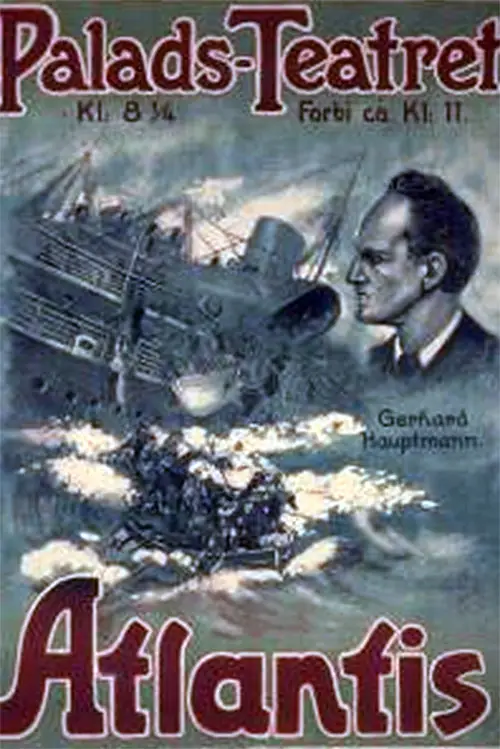Atlantis (1913) From A Novel By Gerhart Hauptmann

Atlantis 1913 film poster by Aage Lund, a Danish Silent Film Directed by August Bloom Based on the 1912 Novel bsy Gerhart Hauptmann. GGA Image ID # 1060e151c5
- Year: 1913
- Film: Atlantis
- Director: August Blom
- Cast: Karl Ludvig Schroder, Axel Garde, Gerhart Hauptmann
- Notes: First film to feature a fictitious love story set on the Titanic, a technique that went on to become a staple in subsequent films on the topic.
Atlantis is a 1913 Danish silent film directed by August Blom, the head of production at the Nordisk Film company, and was based upon the 1912 novel by Gerhart Hauptmann. It starred an international cast headlined by Danish matinee actor Olaf Fønss and Austrian opera diva Ida Orloff. The film was the first Danish multi-reeled feature film.
The story, which tells the tale of a doctor who travels to the United States in search of a cure for his ailing wife, includes the tragic sinking of an ocean liner after it strikes an object at sea. Released only one year after the sinking of the RMS Titanic, the movie drew considerable attention as well as criticism due to similarities to the actual tragedy.
The high production costs for Atlantis were not equaled by box office returns at that time. However, the film went on to become the most watched film for Nordisk Film and has been hailed by film historian Erik Ulrichsen as a Danish masterpiece and "one of the first modern films."
Atlantis: A Novel. By Gerhart Hauptmann. Translated by Adele and Thomas Seltzer. New York: B. W. Huebsch.
Gerhart Hauptmann's novel, like almost all of his other productions, is concerned with a hero who can suffer, but not do, act, construct. From "Sonnenaufgang" (1889) to "Emanuel Quint" (1910), "Die Ratten" (1911). and "Gabriel Schillings Flucht" (1912), Hauptmann's leading characters do not "lead." In his dramas this fault is even more serious. The kick of defensive or constructive will, and the pessimistic philosophy that goes with such it lack, are well expressed in Hauptmann's play "Das Friedensfest" (1890), one of whose characters says: "The will is a straw!
... The will, get out with your will! I know better! One may will and will a hundred times, and everything remains as it was!"
in the present novel a German physician, deserting his family to follow a young danscuse named Ingigerd to New York, narrowly escapes a shipwreck much like that of the Titanic. In America he learns that his lady love Is already at heart of the demi-monde; he escapes to Connecticut to regain his balance, is nursed through typhoid fever by Eva Burns, a young artist, and then returns to Germany. In the course of the story the hero wrongs both the danscuse and a Russian steerage passenger.
Throughout the story the reader gets the effect of tremendous forces in combat, but upon careful examination sees that this impression comes from the masterly literary treatment of gigantic physical forces in action rather than from any spiritual struggle.
Hauptmann's hero fails, because ho does not conquer himself: the temptation is removed, is made no temptation, because Ingigerd sinks to the depths. Nor can the humdrum ending of the novel, in which Eva Burns nurses Frederick through typhoid fever, and after the death of his poor insane wife goes to Europe with him to be a mother to his children and with him to live a life of devotion to art, disguise this failure one whit.
The underlying theme of "Atlantis" is : neither great nor unusual. The book's strength lies In its external form, its wonderful descriptions. Its equally marvellous characterization, its vivid imagery, its record of accurate observation of men and things. its striking figures. In short, in its brilliant style. It Is quite remarkable how even as skilful an artist as Hauptmann could paint the picture of storm and shipwreck (both moral and physical) and the hair-breadth rescue (also both moral and physical)
I without having gone through some such dreadful experience himself. He sees everything, he hears everything— even the sense of smell is alert and its experience recorded.
The condiment of satire on America and tie Americans sprinkled upon this literary dish is rather flat. We have heard before of the worship of the dollar, of the depreciation of art, of haste, gross ignorance. unrest, etc., etc., as specifically American virtues.
Autobiographical elements appear in the hero's interest In art, and especially in sculpture -- Hauptmann is said even now to do good modelling in his wonderful house at Agnetondorf —and Dr. von Kammacher's early biological studies perhaps hark back to Hauptinann's student days in the Jena of Haerkel.
The translation by Adele and Thomas Seltzer Is with few exceptions well done.
Bibliography:
Atlantis (1913 film) - From Wikipedia, the free encyclopedia
The Nation, January 2, 1913, Page 11
